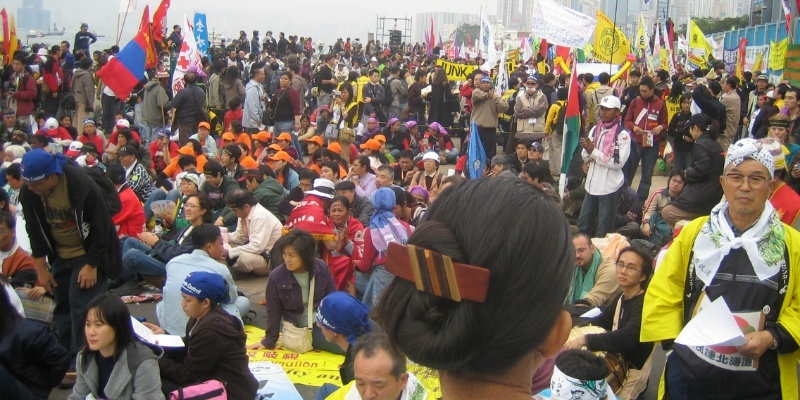When Wu Chi Wai attended seminary in then-British colony Hong Kong in 1980, he took part in passionate discussions about universal suffrage, the ideals of a one-man-one-vote system, and the opportunities for democracy to take root in Hong Kong. More than 30 years later, those ideals are still dreams for the university students at Pastor Wu’s church.
Starting Sept. 26 tens of thousands of dreamers, both young and old, inundated the island’s main throughways to protest Beijing’s tightening control over the region. Police response varied throughout the weeks-long protests, yet standoffs between police in riot gear and protesters shielding themselves with umbrellas gave the protests the name “The Umbrella Revolution.”
Amid the undulating crowd, Wu and about 50 other pastors and seminary students took shifts standing with a 20-foot-tall white cross. They offer prayer, spiritual counsel, and advice to the protesters “to demonstrate God’s presence among them.” Groups of Christians holding signs saying “Lord give us peace” gathered to read the Bible and sing hymns. Some churches opened their doors as support centers, allowing protesters–regardless of their political persuasions–a place to pray, rest, and use bathrooms.
Christians make up about one-fifth of Hong Kong’s population and play a significant role in the democracy movement, yet churches remain divided about how to respond to the restive political climate.
While the communist regime in mainland China ostentatiously quashed Christianity in the late 1940s, Christianity flourished in Hong Kong under British rule. Churches and missionaries provided much-needed education and social services to a stream of refugees fleeing from mainland China. Even today Christian groups run about half of all public schools.
In 1997 Britain handed Hong Kong over to China, raising fears among Hong Kong Christians that Beijing would clamp down on their freedoms. But instead the Chinese government allowed Christians to continue meeting, evangelizing, and serving the community. With tensions eased, Beijing presented Hong Kong pastors an offer many couldn’t refuse: access to mainland China’s expansive mission field through a partnership with the government-sanctioned Three-Self church.
Francis Yip, a professor at Chung Chi Divinity School of the Chinese University of Hong Kong (CUHK), said before the handover Christians didn’t know how they could evangelize on the mainland: “But the success of the befriending policy of the Communist Party toward the evangelical church means that they now have … opportunities to do their work in China.” Hong Kong pastors have developed relationships with Three-Self church pastors, met with officials, trained pastors, and even built a harmony theme park in Northeast China.
In return for access, those pastors stopped criticizing the central government, kept politics out of the pulpit, and overall became pro-establishment. They enjoyed a high level of religious freedom and didn’t want to rock the boat and lose access to what Yip calls “the great opportunity of spreading the gospel in mainland China.”
Some Christians saw worrisome changes after the 1997 handover, especially related to church-run schools. Yip said the government required schools to establish management boards to keep them independent from their sponsoring bodies, and limited to 60 percent the number of board members who could come from the church.
Last year tensions between Hong Kong and China ramped up again. China-backed companies strong-armed newspapers that spoke out against the government. Pro-democracy journalists faced knife attacks. In June, Beijing released a white paper reminding Hong Kong that the central government has “comprehensive jurisdiction” over Hong Kong, and that the “high degree of autonomy enjoyed by Hong Kong is subject to the central government’s authorization.” On July 1, Occupy Central with Love and Peace, whose leadership includes Rev. Chu Yiu-Ming and outspoken Christian Benny Tai, staged a peaceful sit-in to commemorate the 17th anniversary of Hong Kong’s handover. Half a million people jammed the roads, and police arrested 500 protesters who refused to leave.
The precipitating event of the current protests occurred on August 31, when China announced that a committee filled with Beijing loyalists would determine how many and which names appear on the 2017 ballot for chief executive. While some pragmatic Hong Kong residents resigned themselves to that development, Occupy Central saw the move as the beginning of a long fight… Read More
Source and Original Content by Christian Headlines



